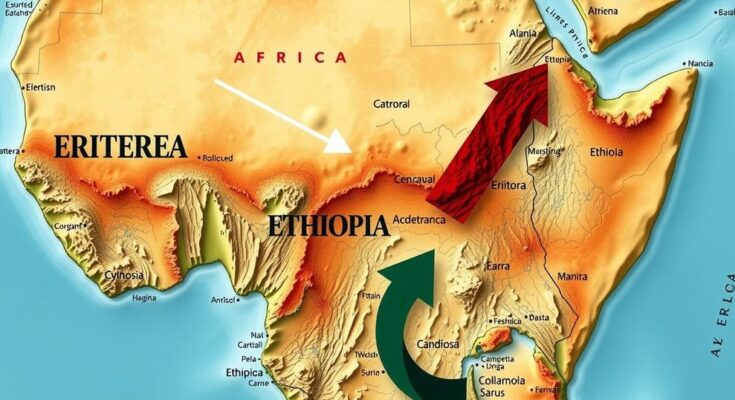Recent discussions among military and political figures suggest an increased likelihood of war between Eritrea and Ethiopia, triggered by collapsing relations. General Abebe Teklehaymanot (Jobe) identified motivations for the conflict, including the desire for territorial control and regime change. He also mentioned potential external interventions and lamented past military decisions regarding Eritrea. The instability could position Tigray as a key conflict zone.
Recent analyses by political leaders and military officials indicate a high probability of imminent conflict between Eritrea and Ethiopia. The frayed relationship following the brief period of warmth between Eritrean President Isaias Afwerki and Ethiopian Prime Minister Abiy Ahmed has led to concerns about escalating tensions. The deterioration in relations has transpired over a span of less than three years, with the public largely unaware of the underlying issues.
General Abebe Teklehaymanot, known as Jobe, a former commander of the Ethiopian Defense Force, recently voiced concerns regarding the looming threat of war in a Tigrigna-language cyber media interview. He asserted, “The two countries are likely heading to war,” citing various indicators of militarization from both nations in recent weeks. Jobe emphasized the uncertainty of wartime outcomes, asserting that understanding the conflict’s objectives is essential for predicting its impacts.
Two primary motivations for a potential conflict were identified by Jobe. The first is the desire to seize Assab, a strategically significant port just sixty kilometers from Ethiopia’s border, which Ethiopia lost access to after a period of neglect attributed to former Prime Minister Meles Zenawi. The second motivation involves the regime change objective targeting Shabia, the ruling party in Eritrea, which many believe has previously received U.S. support for such an agenda, albeit weakened under the Trump administration.
Additionally, Jobe speculated on the potential for external intervention by various state actors, including Egypt, Saudi Arabia, and the United States, all of which may have their own strategic interests in the conflict. Reflecting on the past, Jobe lamented the missed opportunity to neutralize Shabia during the 1998-2000 war. He referenced internal disagreements within the Tigray People’s Liberation Front (TPLF) regarding military actions against Eritrea, which ultimately led to a factional purge.
He criticized the decision made after the 2000 war to permit Eritrea to rebuild its military capabilities. The long-standing period characterized by “no peace, no war” persisted until the normalization of relations in 2018, which subsequently collapsed within three years, rekindling conflicts. Jobe warned that if tensions escalate into war, Tigray may become the central battleground, mirroring the concerns of current TPLF leadership.
The prospect of conflict between Eritrea and Ethiopia appears increasingly likely, spurred by deteriorating relations and military mobilizations. General Jobe highlights the motivations behind a potential war, including territorial control and regime change. He further draws attention to the historical context of failed military decisions and speculates on external interventions that could complicate the situation. The implications of such a conflict could significantly impact the broader region, particularly Tigray.
Original Source: borkena.com




